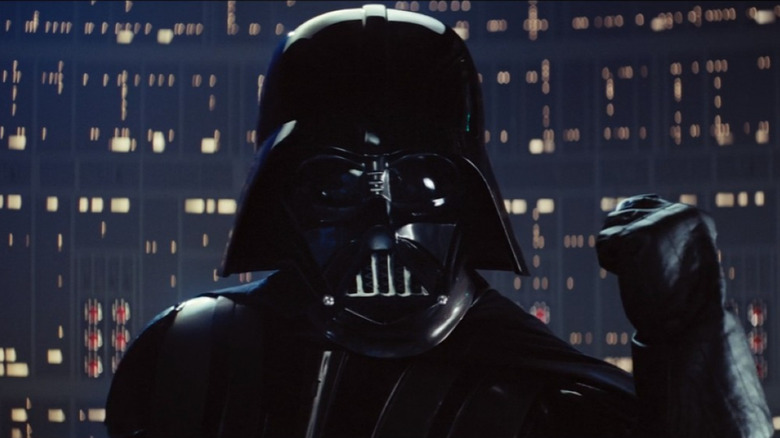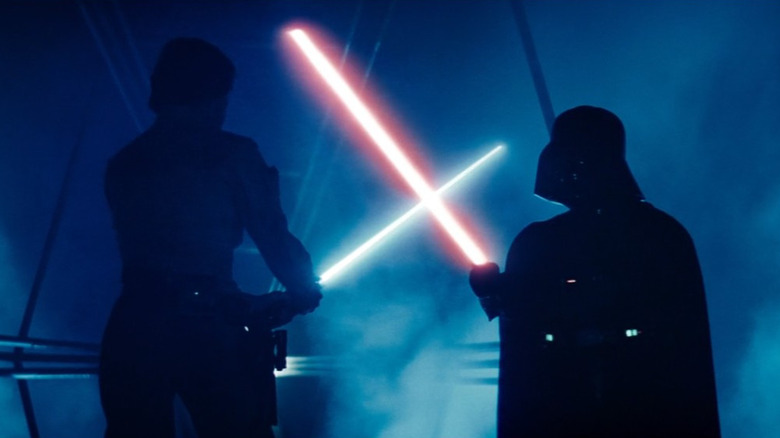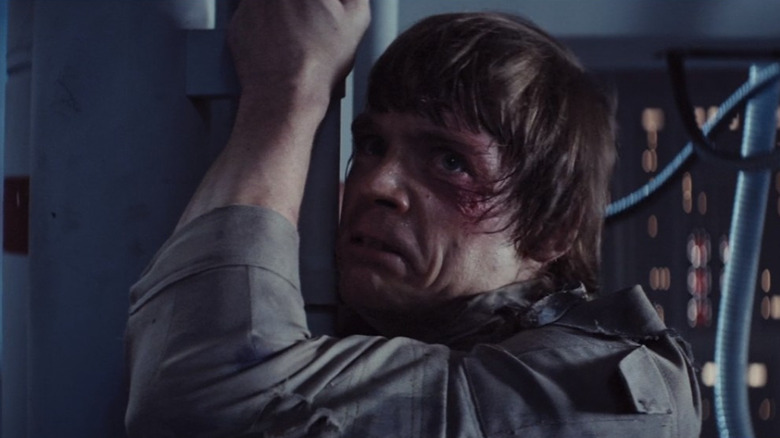Star Wars Fans Refused To Believe This Darth Vader Rumor (Even Though It Was True)
Darth Vader (David Prowse, Hayden Christensen, and James Earl Jones) is one of the most terrifying and influential villains in the history of cinema. From his introduction in "Star Wars: A New Hope" 50 years ago up until his most recent appearance in "Obi-Wan Kenobi," he has been terrorizing a galaxy far, far away. One of the moments that made him a massive hit was the culture-altering reveal that he is Luke Skywalker's (Mark Hamill) father. But according to magazines at the time, that twist was leaked early, and fans simply refused to believe it.
The first official Lucasfilm fan relations officer, Craig Miller, was tasked with drumming up as much excitement as he could for "The Empire Strikes Back" between the years of its release and the film that came before it, "A New Hope." He did so by churning the rumor mill and releasing statements that Han Solo (Harrison Ford) would die, Leia (Carrie Fisher) would choose Luke over him, and Obi-Wan Kenobi was the one who killed Luke's father.
Some of Miller's rumors turned out to be true, including that there would be an ice planet and that Boba Fett (Jeremy Bulloch and Temuera Morrison) was supposed to be one of the main villains of a "Star Wars" franchise initially intended to include 12 films and not just nine. But the rumor that the biggest villain was the father of the lead hero was a little too unbelievable at the time.
It was an unbelievable truth lost in lies
A HuffPost article recalling some of the biggest "Star Wars" rumors to hit the stands quoted a 1980 article from Starlog that claimed, "And more than once, we've heard that it turns out that Vader is really Luke's father! Of course, we've also heard, from reliable sources, that Ben Kenobi is really Luke's father, and, from still other sources, that Ben killed Luke's father." Some other prevalent rumors were about Han Solo becoming a Jedi, a love triangle between the three leads, and the Millenium Falcon slipping into a black hole and going back in time, all of which seemed completely unbelievable.
With all of these rumors flying about without any way of corroborating the information, there was no telling what was real and what was fake. After watching the evil Darth Vader and the hopeful Luke Skywalker on-screen, there's little wonder as to why fans refused to believe that Vader was his father. Even the wording of the publication seemed to discount it, along with some other rumors that never materialized.
If something like this were to happen today, it would be like fans reading a tweet full of Marvel Cinematic Universe scoops that culminated in Thanos (Josh Brolin) allegedly being Tony Stark's (Robert Downey Jr.) father. Of course, that isn't even close to true, and if someone put it out in the world, it would immediately be dismissed as complete and utter ridiculousness. Back in 1980, "Star Wars" fans more than likely had the same reaction. Even one of the actors involved in the twist didn't believe it at first.
Even Darth Vader didn't know he was Luke's father
In an interview with Heat Vision, James Earl Jones confessed that he was surprised by the rumor, even after reading it in the script for the first time. "When I first saw the dialogue that said, 'Luke, I am your father,' I said to myself, 'He's lying. I wonder how they are going to play that lie out?'" If the man who voiced the villainous Dark Lord of the Sith didn't believe it, it should be no surprise that fans similarly struggled to come to grips with it.
One of the reasons that Jones didn't believe it could have to do with the fact that it wasn't a part of the original script. In an alleged copy of the original script that leaked online, the twist wasn't part of the film, and neither were other changes like Luke losing a hand. According to the Vice docuseries "Icons Unearthed: Star Wars," Lucas' ex-wife, Marcia, claimed that the twist is the product of a joke made during a dinner party with screenwriters Willard Huyck and Gloria Katz. After some discussion on Lucas' struggles to write the sequel, Huyck teased, "You can always make Darth Vader Luke's father."
The rest is history, and fans were treated to a twist ending that changed "Star Wars" forever. Neither the fans nor the actors may have believed it, but Lucas delivered the twist and cemented himself as one of the most legendary filmmakers of all time.


